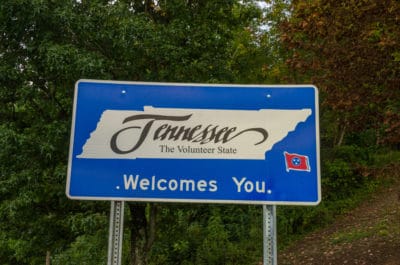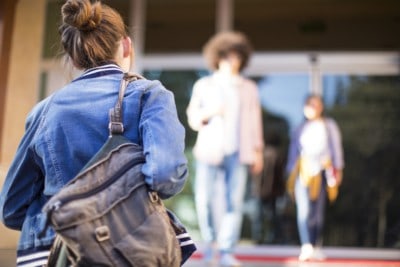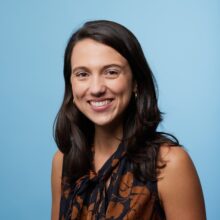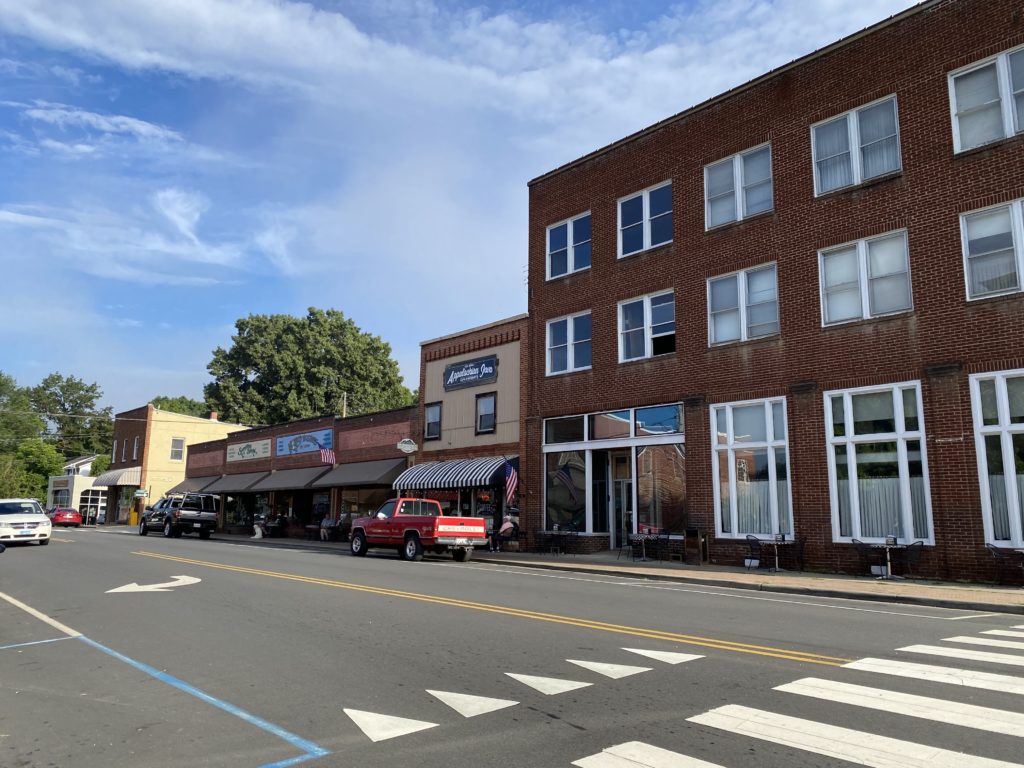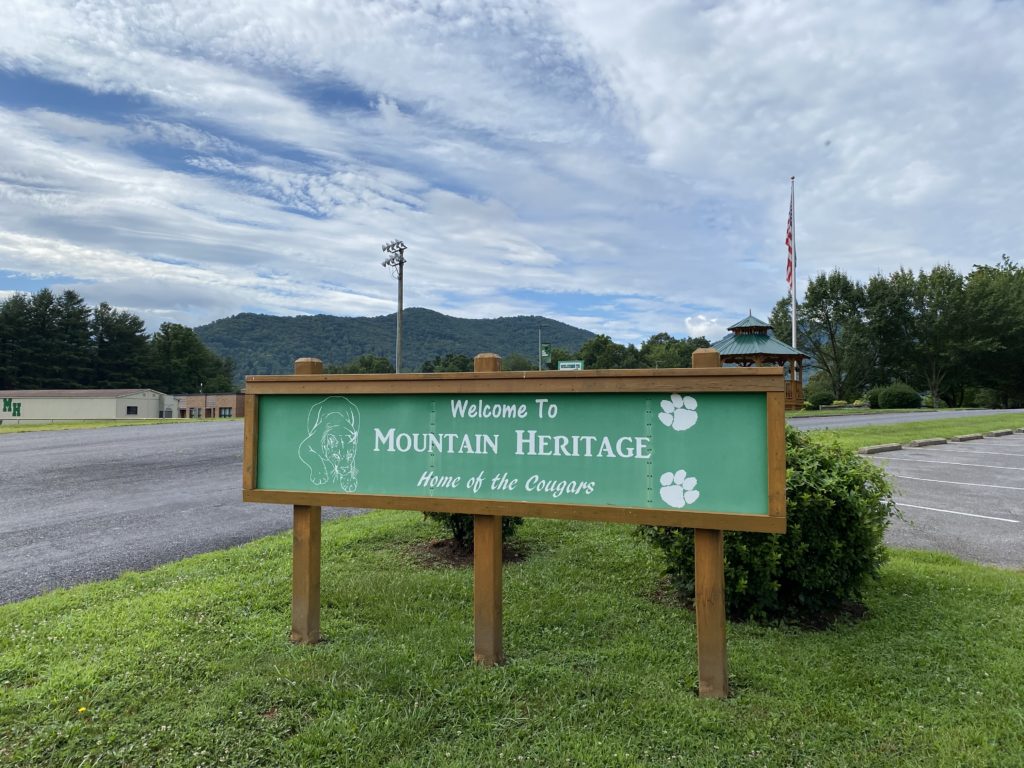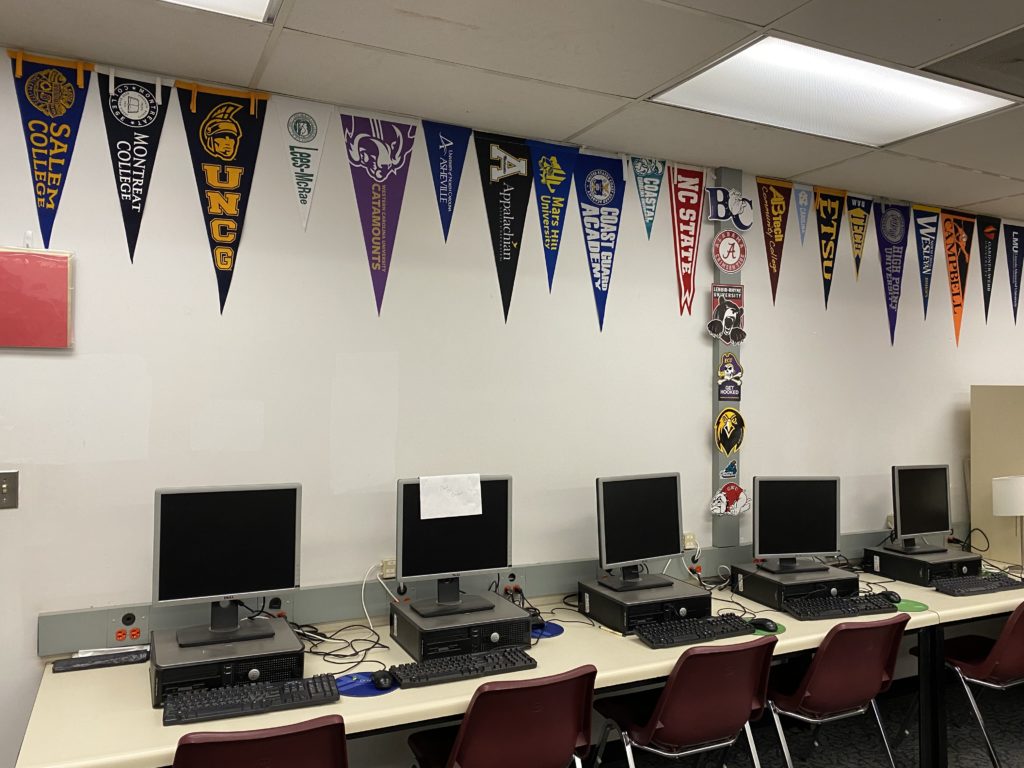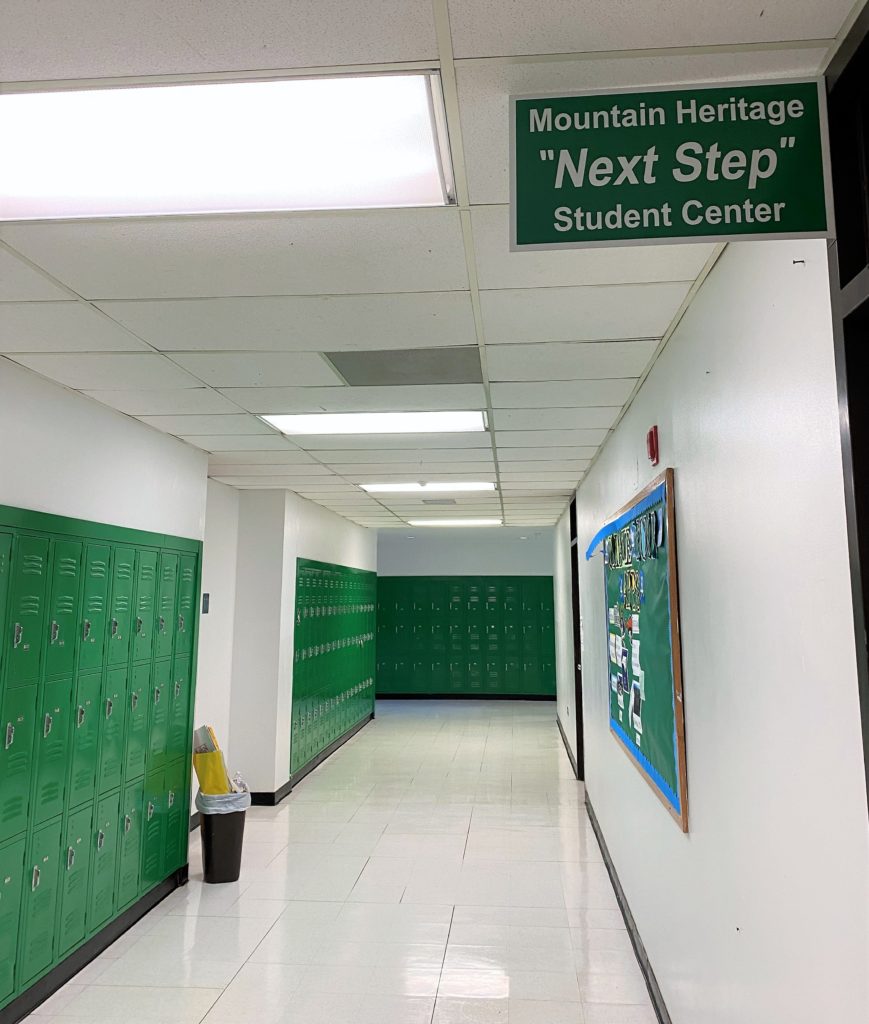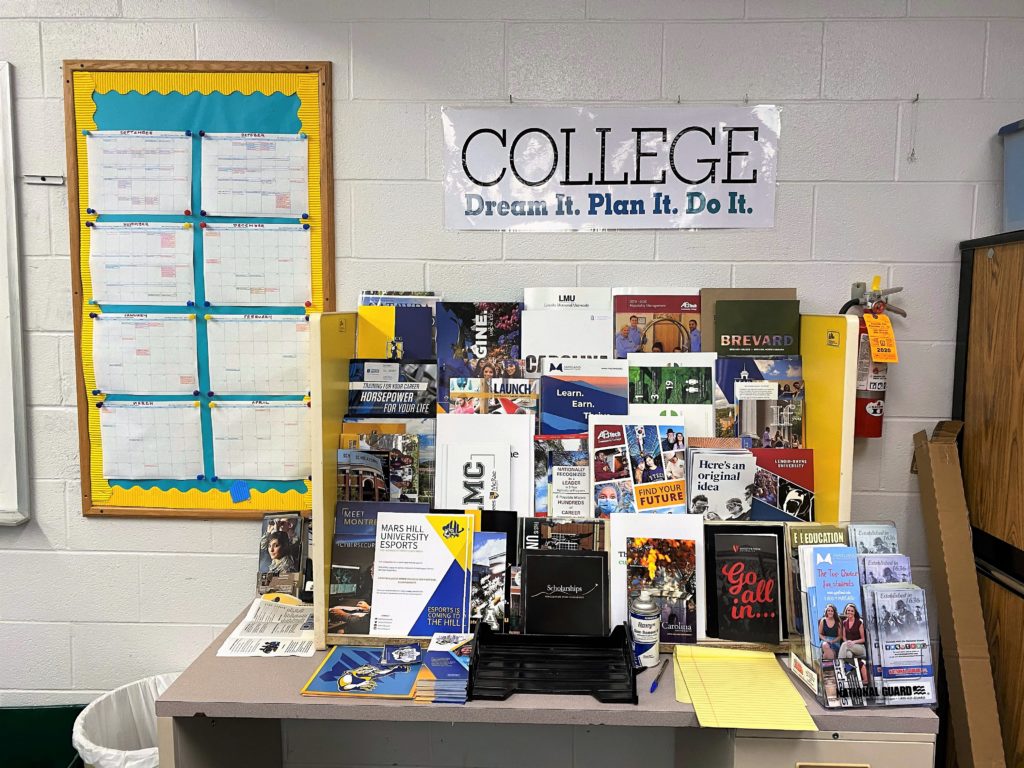Thirty minutes from the Tennessee border and 40 minutes northeast of Asheville sits Burnsville, North Carolina — Yancey County’s seat, the location of Mt. Mitchell, and home to Mountain Heritage High School.
As the only high school in Yancey County Schools, Mountain Heritage enrolls just under 700 students. And this year, the district boasts one of the highest FAFSA completion rates in the state. The FAFSA is a form used to determine eligibility for federal financial aid, and at times, also determines state, institutional, and private aid.
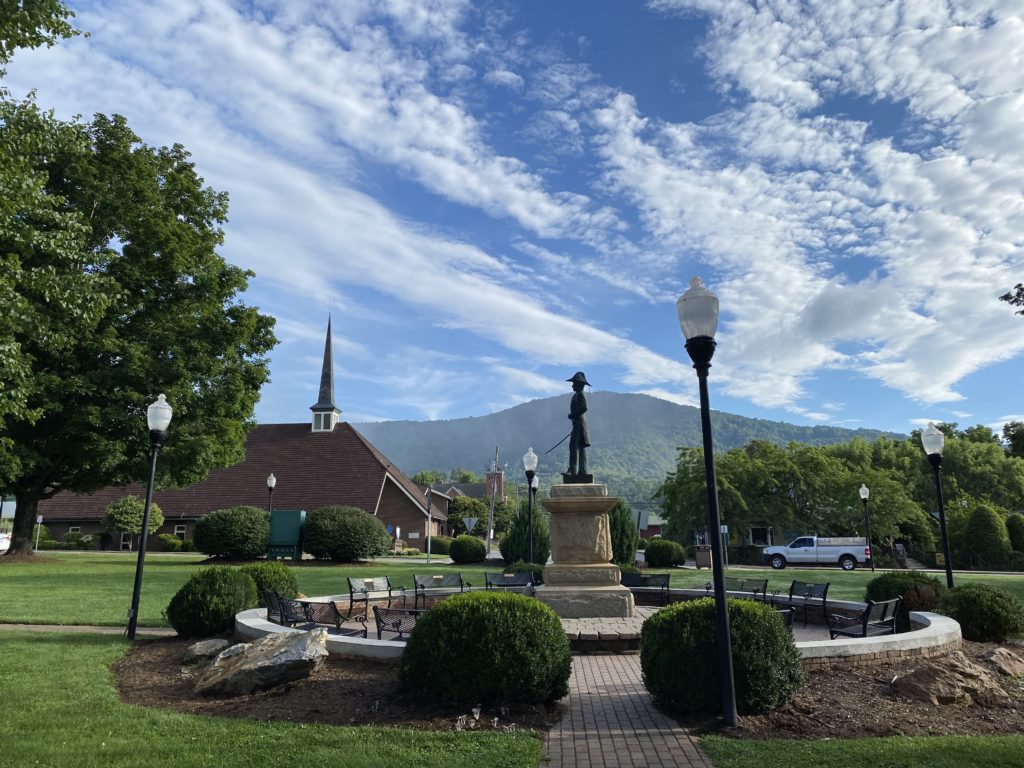
The town square in Burnsville features a statue of Otway Burns, a naval hero of the war of 1812. Analisa Sorrells/EducationNC 
W. Main Street in Burnsville. Analisa Sorrells/EducationNC 
From certain parts of Mountain Heritage High’s parking lot, you can view the peak of Mt. Mitchell. Analisa Sorrells/EducationNC
Why does that matter? According to a 2020 report by Education Strategy Group, students who complete the FAFSA are more likely to enroll in higher education – 90% of FAFSA completers attend college directly after high school, compared to just 55% of students who don’t complete the FAFSA. And, FAFSA completers are more likely to persist in their coursework and obtain a degree.
But there are numerous barriers to completing the FAFSA, including form complexity, a lack of awareness, and parental mistrust. As of July 31, North Carolina’s FAFSA completion rate for 2020-21 graduates is 59.8%, but myFutureNC has a FAFSA completion rate goal of 80% by 2030.
Beyond having one of the highest FAFSA completion rates in the state, Yancey County Schools has also seen incredible growth year-over-year. According to the methodology used by Appalachian State’s GEAR UP, the district’s FAFSA completion rate increased by 16 percentage points from 2019 to 2020. The latest federal data shows that Yancey County has a 65-69% FAFSA completion percentage, with only one North Carolina district in a higher bracket.
We visited Mountain Heritage High to learn more about their approach to college access and FAFSA completion. Here are three key aspects of their strategy.
Yancey County, North Carolina
Population: 18,609
Race/ethnicity: 96.4% white, 5.5% Hispanic/Latino, 1.1% Black
Population age 25+ with a bachelor’s degree or higher: 20%
Poverty rate: 17.8%
Source: U.S. Census QuickFacts
1. Dedicated time, space, and staff
To understand Yancey County’s FAFSA success, it’s crucial to understand the role of two organizations in providing both staff and programming focused on college access — GEAR UP Appalachian and Appalachian College Advising Corps.
Since 2012, Yancey County Schools has worked in partnership with GEAR UP, which stands for Gaining Early Awareness and Readiness for Undergraduate Programs. The federally funded college access program “is designed to increase the number of low-income students who are prepared to enter and succeed in postsecondary education.” Appalachian State currently administers a GEAR UP program in partnership with 11 western school districts, including Yancey.
Eric Klein is the GEAR UP Appalachian coordinator for Yancey County Schools, where he’s been working on college access since 2012. The program serves students in Yancey County beginning in sixth grade through their senior year of high school and offers things like college visits, career days, and academic enrichment. He also works closely with Samantha McClure, a senior counselor at Mountain Heritage who previously worked with GEAR UP Appalachian.
Then there’s Appalachian College Advising Corps, a program that hires recent graduates to serve as full-time college advisers in high-need schools throughout western North Carolina. In 2019, Lila Sheon joined the Mountain Heritage High team through the program.
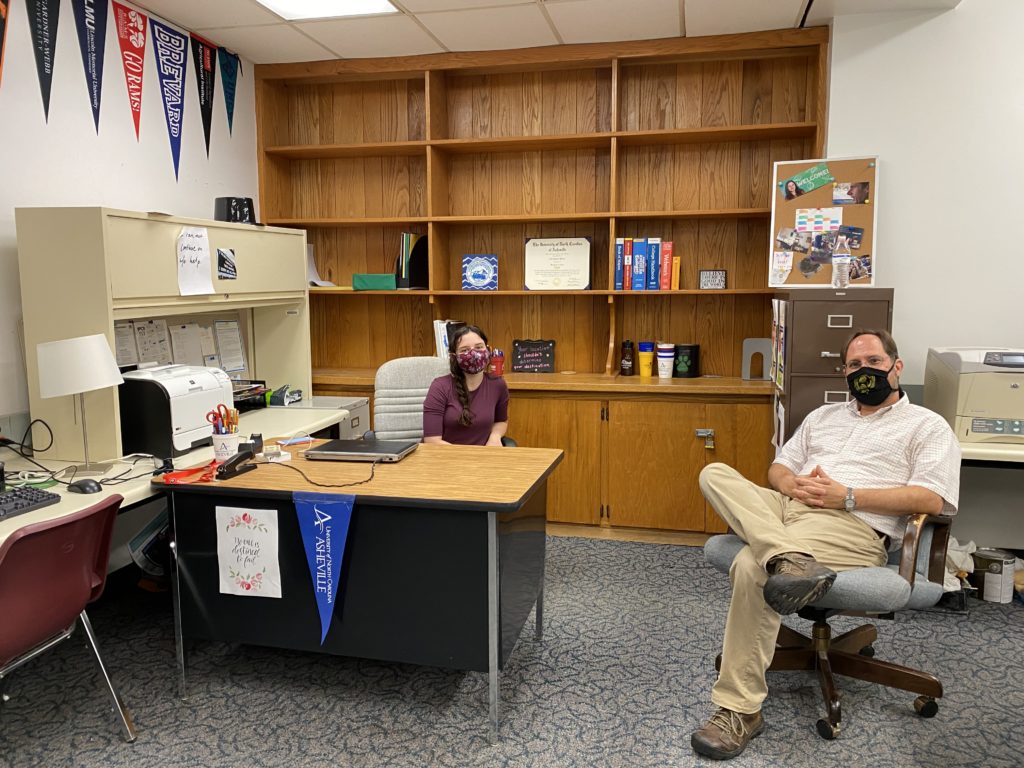
Together, Klein, McClure, Sheon, and others in the school’s counseling department work to ensure every student has a plan for after graduation.
Beyond having a dedicated college access team, the school also has a dedicated space for all-things college access — the Next Step Student Center. The room is filled with computers. Brochures, financial aid information, and college pennants line the walls. It functions as Sheon’s office and as a space where students can come to work on college applications, apply for scholarships, and more.
Twice a year, Sheon pulls every class from each grade into the Next Step Student Center for dedicated college advising sessions. What the students work on varies based on their grade. This dedicated time spent in a dedicated space makes a difference in the school’s college access work.
“Teachers willing to give students time to go downstairs and lose class time is crucial. Because that could start a huge argument over who’s important, what’s important. I think our focus on students is what keeps us from doing that,” said Kevin Huskins, principal of Mountain Heritage High.
“It’s not just about my own little world and what I’m covering content wise — it’s about what the student needs,” said Huskins.
Related Readings

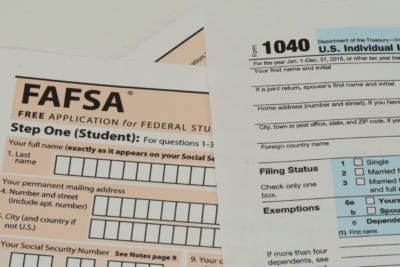

2. A caseload approach
Step-by-step, the team at Mountain Heritage High walks every student through the process to fill out a FAFSA, and a caseload approach ensures that no student slips through the cracks.
The process begins in the spring of students’ junior year. During a visit to the Next Step Student Center, each student creates a FSA ID — the login credentials needed to access the FAFSA online.
“In some ways, it is harder to create than the FAFSA itself,” said Sheon.
That’s due to a few reasons — students have to know their Social Security number, and they have to answer security questions that they may not remember the answers to months later. To verify their credentials, they have to enter an email address or a cell phone number, and not every student has a cell phone with texting capabilities. Parents also have to create an FSA ID to fill out their portion of the FAFSA.
To smooth the process, the school securely stores all of the students’ username and password information so they’re available when they return in the fall. There are still hiccups in the process — like when students enter a wrong digit in their Social Security number or switch cell phone numbers — but setting up FSA IDs during their junior year provides more time to work through those issues.

College pennants and computers line the wall in the Next Step Student Center. Analisa Sorrells/EducationNC 
The hallway outside the Next Step Student Center. Analisa Sorrells/EducationNC 
College and finanical aid information on display for students in the Next Step Student Center. Analisa Sorrells/EducationNC
On October 1, the FAFSA application opens, and the team at Mountain Heritage doesn’t waste any time. Last year, seniors returned to the Next Step Student Center by homeroom on October 2 and October 3 to fill out the FAFSA up to the section that requires parents’ information. This process ensures that every single student starts a FAFSA.
Throughout October, the school holds FAFSA family nights where students and their parents can receive help and finish filling out the entire FAFSA together.
Lacee Thomason, a 2020 graduate of Mountain Heritage who is attending East Carolina University this fall on a full ride, said those family nights are very helpful.
“She takes you step by step. And she also tells you, well, have you looked at this? … What are you majoring in? Do you know the cost of tuition?” said Thomason, referring to McClure’s assistance in the college application process. “I feel like their passion for getting us to the next step is most of the work, but the student still has to apply themselves.”
Then, Sheon and McClure review the list of students who have not yet completed the FAFSA using data from an agreement called Finish the FAFSA. They also follow up with students who were flagged for verification, meaning they have to submit additional information. Sheon said students who don’t have a Social Security number or who are experiencing homelessness are often flagged for verification. That can cause concerns for the student since they are often under the impression that they had completed the form.
“I will track them down and literally call them out of class,” said McClure. “We try to do that for every senior so that you can mark off that list — they’re complete, they’re complete, they’re complete. It’s kind of like a caseload.”
Klein said this approach is a unique but crucial part of their college access work.
“As opposed to a cohort model of working with everyone and vaguely offering these one-size-fits-all or fits-none services, I think that for us, those one-off large events … work less than individually, one-on-one, making sure each kid has done each step,” he said.
And this approach applies to every student at Mountain Heritage — not just those who are expected to attend college.
“We meet with every single student. I think that sets expectations and it also just contributes to that culture … if you’re a Mountain Heritage student, you can go to college,” said Sheon.
In the spring, the school hosts “Mayday,” a day when students who haven’t applied to college are strongly encouraged to apply to Mayland Community College. McClure recalled that one year, on the day after students applied, the school bused them over to Mayland to register for classes and complete their FAFSA — all in one day.
“I just think that speaks to the heart of the school and the people that are doing it. You’ve not done anything — we’re doing something for you,” said Huskins.
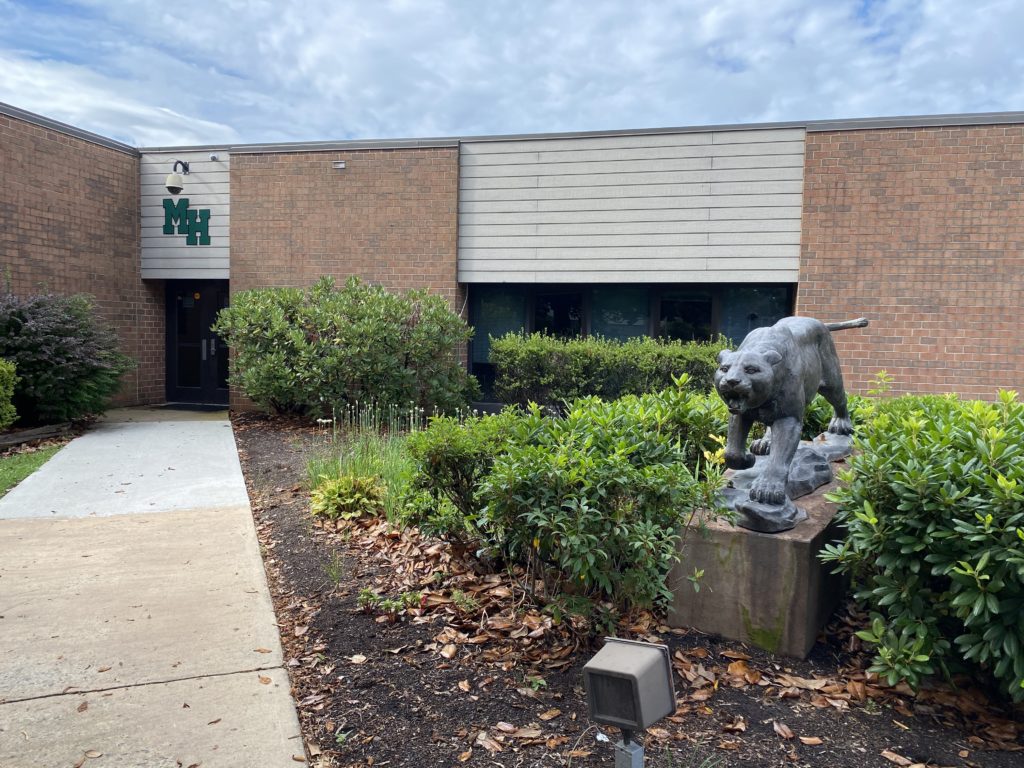
3. Culture and relationships
Thanks to GEAR UP, Yancey County students are introduced to a college-going culture beginning in sixth grade when they begin taking college tours. As a freshman, every student thinks about their five-year plan for what their next step after high school will look like. The FAFSA is just another necessary step in that process.
And it’s not just the students who buy into this culture — the teachers do, too.
“I think we’ve gained trust with the faculty and staff in our schools,” said McClure. “They understand the importance of a college-going culture at Mountain Heritage … They’re not just saying, ‘Oh yeah, we’re sending some kids to college’ … They will come to me and be like, ‘Has so-and-so done their FAFSA?’”
Huskins credits the dedication and collaborative nature of the schools’ staff for the improvement of FAFSA completion rates. “I think that we have passionate people who want to help kids achieve their next steps and their goals,” he said.
He also described a contagious energy among parents who hear about other families that have completed the FAFSA. They then have more impetus to reach out for assistance or attend a FAFSA parent night themselves.
“It’s really been a unique dichotomy of people that have come in and met with each other and talked about it,” said Huskins. “You get these little pockets of people, and that’s how you influence an entire community.”
Sallie Senseney, a science teacher at Mountain Heritage, has also noticed a culture shift. When she was a student at the school herself, she said there was no dedicated effort to ensure every student knew about their options after graduation.
“Now … every student is going to have a conversation with someone about going to college and how to get there and what your options are,” she said. “College is not just one thing. And I feel like that’s something our school does really well, is to value and acknowledge lots of different paths after high school.”
Senseney recalls doing her own FAFSA at home on dial-up internet — a frustrating process with no one to ask for help. She felt like she was going at it on her own. Now, with dedicated staff from GEAR UP and the Appalachian Advising Corps, students know who to turn to as a resource.
“We have what I would call an open door policy. No matter what we’re doing, we can always drop it to help a student,” said Sheon.
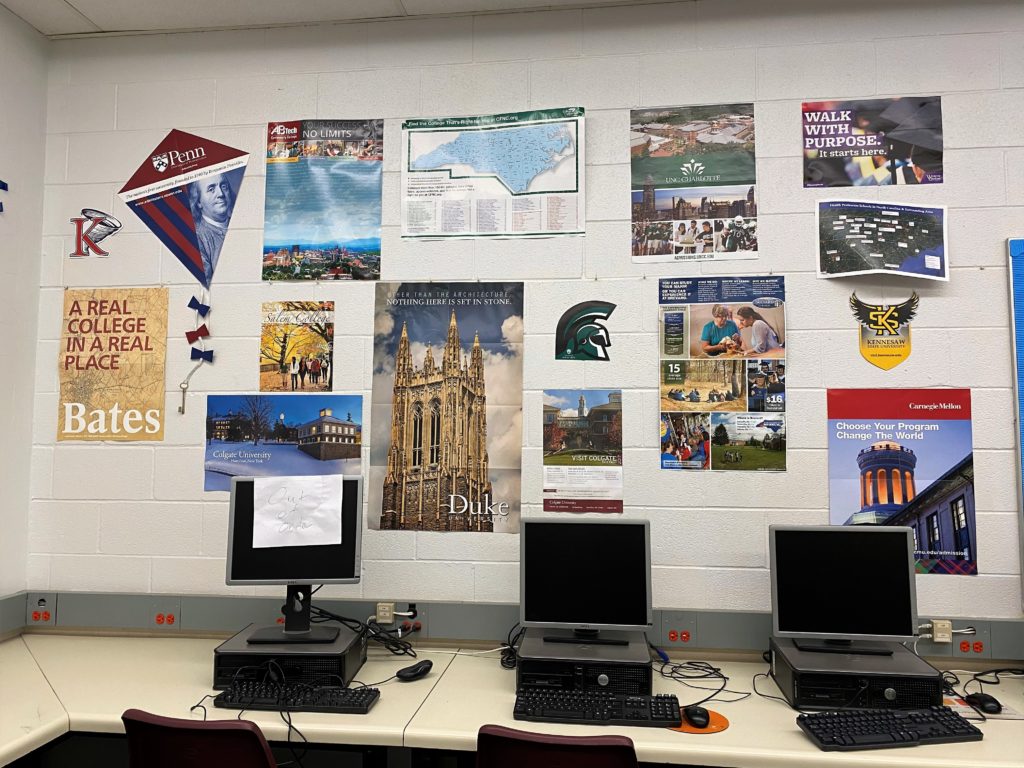
Looking ahead
While most of the class of 2020 had already filled out the FAFSA before COVID-19 closed school buildings in March, the pandemic has prompted uncertainty about what the college advising process will look like moving forward, particularly for rising seniors. Yancey County Schools planned to open under plan B, or a hybrid model, but recently shifted course and will now have all students under plan C, or fully virtual, beginning August 24.
“In person, you can look at the documents with the student and say … which papers are they looking for? Are you sure this is the right document? But it’s very hard to do over the phone,” said Sheon, referring to helping a student with FAFSA verification during remote learning.
Klein is considering a virtual advising portal to provide a process for offering effective college advising during remote learning, but he isn’t yet sure how and when students will receive dedicated time and assistance to work on things like the FAFSA, as they used to when attending school in person.
In a year, Klein’s position will end as the GEAR UP grant funding concludes, and Sheon’s corps commitment will end at the same time. Klein is thinking about how to pass on their institutional knowledge and sustain the roles they have filled over a longer period of time.
Regardless of what this school year looks like, the college advising team is committed to supporting every Mountain Heritage High student. McClure reflected on when she was in high school — as a first-generation college student, she didn’t know where to turn for help.
“We hadn’t completed the FAFSA, and I had no clue how to,” said McClure. “So I put myself in my kids’ position, and that’s where my passion always comes from.”
Look up FAFSA completion rates
Use the map below to see the latest FAFSA completion rate for every local education agency in North Carolina.
Recommended reading

